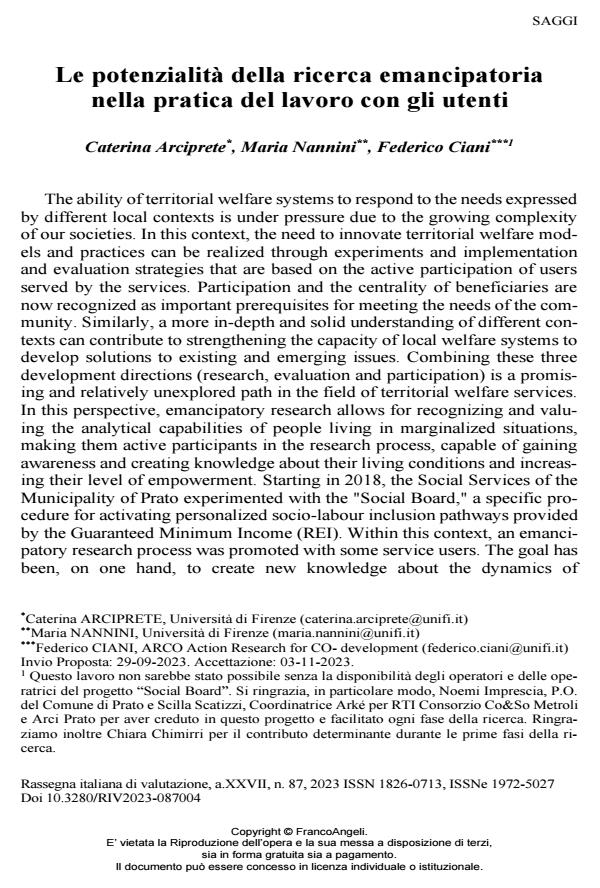Le potenzialità della ricerca emancipatoria nella pratica del lavoro con gli utenti
Titolo Rivista RIV Rassegna Italiana di Valutazione
Autori/Curatori Caterina Arciprete, Maria Nannini, Federico Ciani
Anno di pubblicazione 2024 Fascicolo 2023/87
Lingua Italiano Numero pagine 18 P. 51-68 Dimensione file 319 KB
DOI 10.3280/RIV2023-087004
Il DOI è il codice a barre della proprietà intellettuale: per saperne di più
clicca qui
Qui sotto puoi vedere in anteprima la prima pagina di questo articolo.
Se questo articolo ti interessa, lo puoi acquistare (e scaricare in formato pdf) seguendo le facili indicazioni per acquistare il download credit. Acquista Download Credits per scaricare questo Articolo in formato PDF

FrancoAngeli è membro della Publishers International Linking Association, Inc (PILA), associazione indipendente e non profit per facilitare (attraverso i servizi tecnologici implementati da CrossRef.org) l’accesso degli studiosi ai contenuti digitali nelle pubblicazioni professionali e scientifiche.
The ability of territorial welfare systems to respond to the needs expressed by different local contexts is under pressure due to the growing complexity of our societies. In this context, the need to innovate territorial welfare mod- els and practices can be realized through experiments and implementation and evaluation strategies that are based on the active participation of users served by the services. Participation and the centrality of beneficiaries are now recognized as important prerequisites for meeting the needs of the com- munity. Similarly, a more in-depth and solid understanding of different con- texts can contribute to strengthening the capacity of local welfare systems to develop solutions to existing and emerging issues. Combining these three development directions (research, evaluation and participation) is a promis- ing and relatively unexplored path in the field of territorial welfare services. In this perspective, emancipatory research allows for recognizing and valu- ing the analytical capabilities of people living in marginalized situations, making them active participants in the research process, capable of gaining awareness and creating knowledge about their living conditions and increas- ing their level of empowerment. Starting in 2018, the Social Services of the Municipality of Prato experimented with the "Social Board," a specific pro- cedure for activating personalized socio-labour inclusion pathways provided by the Guaranteed Minimum Income (REI). Within this context, an emanci- patory research process was promoted with some service users. The goal has been, on one hand, to create new knowledge about the dynamics of marginalization and the interaction between users and social services, and on the other hand, to promote an empowerment process for the involved actors. The article shows that the effective involvement of service beneficiaries in the research allowed both users and social workers to reflect on the imple- mentation of social policies, identifying innovative welfare strategies aimed at the actual empowerment of disadvantaged individuals.
Parole chiave:Social services; Empowerment; Evaluation; Emancipatory Research.
Caterina Arciprete, Maria Nannini, Federico Ciani, Le potenzialità della ricerca emancipatoria nella pratica del lavoro con gli utenti in "RIV Rassegna Italiana di Valutazione" 87/2023, pp 51-68, DOI: 10.3280/RIV2023-087004